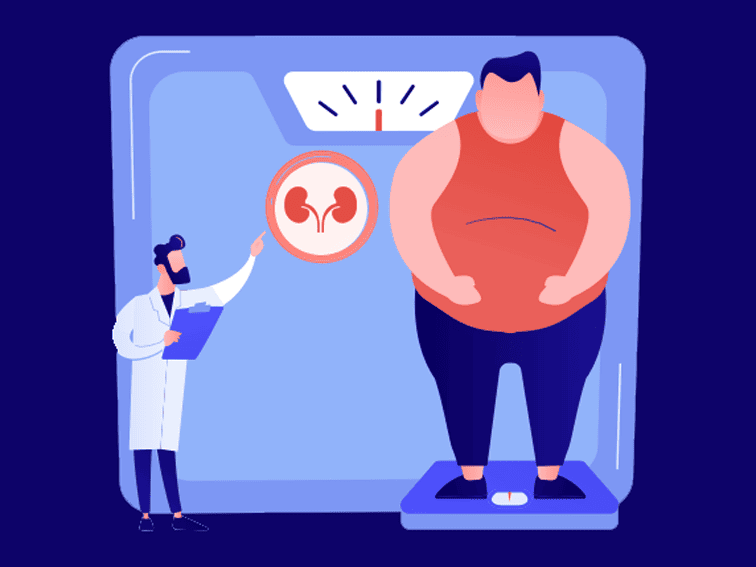Being overweight (a body mass index of between 25 and 29.9) or obese (a body mass index above 30) means your weight is higher than what is considered a “healthy weight.
Body Mass Index (BMI)
- BMI is a measure of body fat based on your height and weight. It is a way to define overweight or obese.
- BMI between 25 and 29.9 is considered overweight.
- A BMI above 30 is considered obese.
You can find the Adult BMI Calculator (on Google) and calculate your BMI.
Obesity and Kidney Disease
Excess body weight or obesity is harmful to your overall health and it is a major risk factor for many conditions like high blood pressure, Diabetes, and kidney disease. Excess body weight means extra work for your kidneys. Your kidneys have to work hard to filter waste from your body. This puts an additional burden on your kidneys to function efficiently and thus increases the risk of developing chronic kidney disease in the long run.
In addition, if you are overweight, your risk for diabetes and high blood pressure increases. These are the two major causes of kidney disease in men and women.
How does obesity cause kidney disease?
Excess fat accumulation affects the kidneys directly through the production of various hormones which lead to the development of abnormal lipid metabolism, oxidative stress, and inflammation and also to the increased resistance to insulin which leads to diabetes
These effects lead to fat accumulation around the kidneys, and increased pressure within the kidneys which can cause damage to the filters in the kidneys.
This damage to the filters will cause protein leak in the urine which eventually will cause scarring of the filtering part of the kidneys (glomerulus)
Ongoing scarring will eventually cause progressive loss of kidney function
Obesity increases the risk of developing hypertension and diabetes which are the two major risk factors for developing kidney disease
How does excess fat affect the kidneys?
Obese men and women are 3 to 4 times more likely to develop kidney disease when compared to individuals with healthy body weight. There are several ways in which excess fat affects your kidneys – one way is that fat accumulates in your kidneys and causes problems. Another risk is that in overweight individuals’ kidneys work harder to keep up with the excess metabolism. The other factors that are common in obese people include inflammation, insulin resistance, and increased production of blood pressure-raising hormones (angiotensin and renin).
In addition, obese individuals are more likely to have one or more chronic diseases such as heart disease, diabetes, and hypertension. All these conditions can increase the risk of chronic kidney disease (CKD).
Higher visceral fat ie. Excess fat around the abdominal area has been associated with a higher prevalence of protein leaks in the urine.
Obesity and kidney stones
Obesity and kidney stones: Obesity is associated with increased sodium and phosphate excretion in urine, excess uric acid formation, acidic urine, and increased excretion of certain chemicals in the urine.
All these factors increase the risk of developing kidney stones.
Bottom Line
The good news is that obesity, as well as the related complications, are largely preventable. Education and awareness of the risks of obesity and a healthy lifestyle, including proper nutrition and exercise, can dramatically help prevent obesity and kidney disease.
Lifestyle interventions such as restricted diet and calorie intake and increased physical activity, a minimum of 30 minutes per day with regular follow-up care can reduce the risk of CKD by up to 40% in obese individuals.
There are many ways to prevent kidney disease – to learn more, visit Bright Kidney Centre.

Leave a Reply